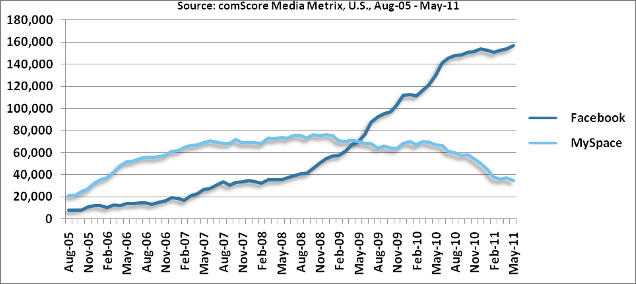Surprising facts about Facebook
To complete the series on the dark side of major websites, here are some little known facts about Facebook. When we know that it was competing in his debut with several major social networking sites like MySpace and Orkut from Google, that his property has been the subject of several disputes with the Winklevoss brothers and more recently with Ceglia, it is miraculous that Facebook has become the largest social network. There is no doubt that its developers work to create the simplest interface possible and even made a compiler to speed up PHP. But it is also because Google did not see their interest, that until the creation of Google+ in 2011 (it would just had done a search ...).
- In 2006, MySpace had 100 million users and Facebook had 12 million. In 2013 facebook has a billion users and MySpace 25 million. Although great communicator, Rupert Murdock learned something on the principle of communicating vessels.
Evolution compared of Facebook and MySpace use in USA (x1000 unique visitors/month):
- Facebook is not an original idea. It was preceded by other similar social networks: PlanetAll, created in 1997 had 1.5 million users when Amazon bought it, to redirect its users to the merchant site. Amazon closed the site in 2000. Friendster, launched in Canada in 2002, MySpace in the U.S. in 2003. Orkut and Facebook were launched in 2004. Friendster has become an Asian social site for games. MySpace a musical platform. And Orkut a local social networking site, before to shut down in 2014.
The first social networking site is probably theglobe.com launched in 1994 which has disappeared. - In September 2012, the CEO stated that achieving the Facebook app in HTML 5 was a mistake and announced a native version. The creator of the Sencha framework then demonstrated by example that they could have built a fast and fluid application by writing better code.
Actually what the CEO of Facebook said about HTML 5 is a little different from what is generally reported, Facebook does not regret choosing HTML 5, it regretted having chosen it for iOS (I would have chosen native too):“When I’m introspective about the last few years I think the biggest mistake that we made, as a company, is betting too much on HTML5 as opposed to native… because it just wasn’t there. And it’s not that HTML5 is bad. I’m actually, on long-term, really excited about it. One of the things that’s interesting is we actually have more people on a daily basis using mobile Web Facebook than we have using our iOS or Android apps combined. So mobile Web is a big thing for us.”
It is clear that native implementation is more effective than HTML 5 when the environment is not conducive to this and iOS certainly is not. If it was webOS equipped with Node.js and designed for JavaScript, things would be very different, because here it is JavaScript that is native!
- The Spartan project is a version of the Facebook site in HTML 5 and especially for IOS.
Several third-party developers are working on its development, some of which are part of Zynga, the games maker for Facebook.
The aim would be to provide to iOS games and applications by bypassing the App Store, which will be replaced by Facebook. Facebook Home in 2013 did the same for Android by adding a Windows-like interface. (Spartan is also the codename of the new Microsoft browser). - In 2009, Brian Acton, who worked 11 years at Yahoo (staff are often fired in that company) applied for employment with Twitter and Facebook. The two companies refused to hire him, so he created its own Web application, WhatsApp. In February 2014, Facebook bought WhatsApp for $ 19 billion.
- In 2012, a former relationship of Zuckerberg, Paul Ceglia, claims to have half the shares of Facebook, with supporting documents. They would have worked together on a project called The Face Book with 50% share for each. (The domain Facebook.com will be redeemed long after by Zuckerberg). He will be charged for fraud, these documents being forged. But before his trial in May 2015, it disappears, only his electronic-monitoring ankle bracelet was found at his home.
- After a hyped announcement, in 2013 was launched Facebook One, a modified Android smartphone with the interface dedicated to the social network. Only 15,000 copies were sold, a resounding failure compared to the number of users of the site. The project is closed in 2014.
- A "clairvoyant" knows your whole life through Facebook. Vidéo.
More info (external link)
Insights about Facebook history. One of the infos here is the Social Network movie is a pure fiction, with names of real persons.






